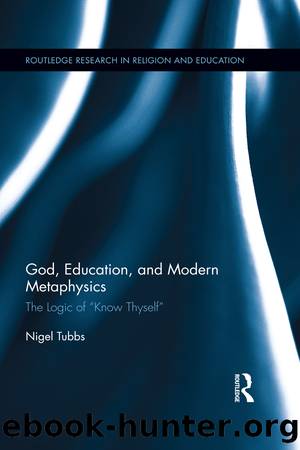God, Education, and Modern Metaphysics by Tubbs Nigel;

Author:Tubbs, Nigel;
Language: eng
Format: epub
Publisher: Taylor and Francis
Kant (1724â1804)
Before looking at Hegel on KT specifically, we turn to Kant, to illustrate KT in the doctrine of virtue from the Metaphysics of Morals (first published in 1797). The first duty of a human being, though not the principal duty, is self-preservation. But as a moral being the greatest violation of a human beingâs duty to himself is âlyingâ (Kant, 1996, 182), for he âviolates the dignity of humanity in his own personâ (1996, 182). Yet to deceive oneself intentionally âseems to contain a contradictionâ (1996, 183).
This inner struggle is the modern courtroom of KT. âConsciousness of an internal court in man⦠is conscienceâ (1996, 189). But to avoid the contradiction here that this court is all one person, Kant distinguishes between the subjectivity of the court and its objectivity in the moral law and the concept and duty of freedom. The duty of oneâs conscience is to âhave to think of someone other than himselfâ (1996, 189).24 It is conscience that has the power of pronouncing the sentence of happiness or misery depending upon the judgment made of the action. Such a person is âa scrutinizer of heartsâ (1996, 190) in relation to the objective moral commands. As such, conscience âmust be thought of as the subjective principle of being accountable to God for all oneâs deedsâ (1996, 190). Conscience is the subjectivity of knowing oneâs self obliged to submit freely to the truth of the laws of practical reason, or to God as the omnipotent moral being. Religion here is âa duty of the human being to himselfâ (1996, 193).
Therefore, this internal court of morality requires that the first command of all duties to oneself is KT, that is, to know oneâs heart, to know where one finds oneself in the relation between heart and duty. Kant says,
Moral cognition of oneself, which seeks to penetrate into the depths (the abyss) of oneâs heart which are quite difficult to fathom, is the beginning of all human wisdom. For in the case of a human being, the ultimate wisdom, which consists in the harmony of a human beingâs will with its final end, requires him first to remove the obstacle within (an evil will actually present in him) and then to develop the original predisposition to a good will within him, which can never be lost. (1996, 191)
Download
This site does not store any files on its server. We only index and link to content provided by other sites. Please contact the content providers to delete copyright contents if any and email us, we'll remove relevant links or contents immediately.
Machine Learning at Scale with H2O by Gregory Keys | David Whiting(3653)
Never by Ken Follett(3543)
Fairy Tale by Stephen King(2960)
The Man Who Died Twice by Richard Osman(2818)
Reminders of Him: A Novel by Colleen Hoover(2779)
Will by Will Smith(2588)
Rationality by Steven Pinker(2155)
It Starts With Us (It Ends with Us #2) by Colleen Hoover(2049)
Friends, Lovers, and the Big Terrible Thing by Matthew Perry(2011)
Can't Hurt Me: Master Your Mind and Defy the Odds - Clean Edition by David Goggins(2007)
The Stranger in the Lifeboat by Mitch Albom(1941)
The Becoming by Nora Roberts(1925)
Love on the Brain by Ali Hazelwood(1824)
New Morning Mercies: A Daily Gospel Devotional by Paul David Tripp(1814)
HBR's 10 Must Reads 2022 by Harvard Business Review(1702)
The Strength In Our Scars by Bianca Sparacino(1701)
A Short History of War by Jeremy Black(1677)
Never Finished: Unshackle Your Mind and Win the War Within by David Goggins(1562)
515945210 by Unknown(1524)
